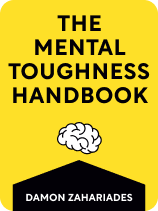

This article is an excerpt from the Shortform book guide to "The Mental Toughness Handbook" by Damon Zahariades. Shortform has the world's best summaries and analyses of books you should be reading.
Like this article? Sign up for a free trial here.
Want to know how to become mentally tough? What are the best strategies or exercises?
To confront challenges and navigate adversity, Damon Zahariades suggests learning how to become mentally tough, which means building mental fortitude and resilience. In The Mental Toughness Handbook, he provides the essential techniques he’s learned for building mental toughness.
Read on to learn how to become mentally tough by implementing Zahariades’s strategies.
Becoming Mentally Tough: 5 Strategies
Damon Zahariades is a productivity expert and owner of ArtOfProductivity.com, where he explores time management strategies, reviews productivity apps, and teaches people how to create habits to get more done and enjoy their free time. He has also authored other books on these topics, including The Time Management Solution and The Art of Letting Go. If you want to learn how to become mentally tough, Zahariades’s exercises and strategies are one of the best starting points.
In this article, we’ll look at five strategies Zahariades recommends to become mentally tough from his book The Mental Toughness Handbook.
#1: Manage Your Negative Feelings
To become mentally tough, Zahariades says you have to embrace, understand, and manage negative feelings to perform at your peak. As we discussed earlier, emotions like anger and fear can derail you by leading you to make poor decisions or fail to take action.
To do this: Practice managing your negative feelings regularly:
1. Rationally analyze anger, fear, and sadness as soon as they arise. Ask yourself whether the negative feeling is aligned with logic and reason and whether it’s hindering your progress.
2. Meditate for five minutes each day. During this process, aim to observe negative emotions that arise without criticizing or labeling them, and challenge the veracity of negative self-talk when you become aware of it.
3. Practice gratitude. Take a few minutes each morning, afternoon, and evening to reflect on things in your life that you appreciate, that have gone well, and that you can celebrate. Doing this repeatedly will give you small victories that trigger the reward system of your brain, leading to sustained feelings of happiness. Further, Zahariades says this practice will prevent you from hyper-focusing on things that are going poorly, which can leave you swirling in a toxic brew of disappointment and unhappiness and prevent you from making positive change.
#2: Build Your Confidence
Zahariades says that to become mentally tough, you have to be confident in your ability to navigate difficult situations. You can increase your confidence by challenging negative self-talk and validating yourself.
Address Your Inner Critic
Zahariades says that we all have an inner critic that judges and tells us we’re doing things poorly. The critic’s goal (though misguided in its messaging) is to keep you safe from harm—a relic of evolutionary strategies aimed at managing risk by assuming the worst. When your inner critic bombards you with negative talk, like, “You’ll never make it!” “Everyone thinks you’re stupid!” and “You can’t do anything right!” respond to it with positive self-talk. This will prevent it from eroding your confidence in your ability to manage difficult situations and try new things, which can limit your progress.
To do this: Be on the lookout for attacks from your inner critic. When they arise, address them immediately by showing yourself the same kindness you’d show a close friend who’s feeling down.
For example, if your inner critic says: “You can’t do anything right!” counter that negative message with: “That’s not true. Today I fed and walked my dog, worked so I can pay my bills, and called my grandmother to say ‘hi’, which made her feel special.” Being compassionate toward yourself will make you feel more confident, which will help you deal with difficult situations more effectively and increase your willingness to take risks, helping you to become mentally tough.
Practice Validation
When you rely on others’ approval to feel confident and tell you what, when, and how to do things, Zahariades says you learn not to trust yourself and your capabilities. In contrast, when you validate yourself—by recognizing your unique talents, skills, and knowledge base—you can navigate challenges and uncertainty more effectively.
To do this: List the biggest things you lack confidence about and steps you can take to diminish their impact on your self-assurance. For example, if you lack confidence in your ability to make decisions, commit to making at least one low-stakes decision each day to increase your confidence. This might be something as small as choosing a new salad dressing at the grocery store or reading a new book every other week to expand your knowledge base. Doing this repeatedly will build your confidence in and positively reinforce your ability to make decisions.
#3: Face Challenges & Overcome Them
Zahariades argues that to become mentally tough, you have to demonstrate courage in the face of adversity even when the outlook is poor. When you identify and address challenges proactively and with an action-oriented mindset, you offset feelings of paralysis and prepare yourself to respond to the obstacles you face productively and with confidence.
To do this: Accept the situation directly and refuse to let it overwhelm you. Zahariades acknowledges that this can be a tall order if, for example, you’ve been diagnosed with a life-threatening illness or lost a loved one. But, he says, when you’re able to regain control over your mind, you’ll be better prepared to address the problem.
(Shortform note: In High Performance Habits, Brendon Burchard argues that high performers confront difficult situations by adopting a mindset of gratitude for hardship that helps them overcome fears and navigate obstacles. Getting into this mindset starts with appreciating that adversity is often required to achieve success and that it toughens you up by helping you develop a thick skin and character. To cultivate this mindset, welcome the challenge. Recognize that there’s no easy road to success and that tasks that frustrate you will help you grow. And when the road gets rough, remind yourself that better times are ahead and that you’re working toward your goal.)
#4: Reframe Failure and Obstacles as Opportunities
Zahariades says that when you change your perception of failure, you won’t feel like a victim of difficult situations. To become mentally tough, view failure as an inevitable part of life and valuable feedback that you can learn from—rather than something that’s bad or a reflection of your poor character or inadequacies.
When you’re open to learning from your mistakes, you’re telling yourself that it’s okay to not be perfect, and you have the capacity to grow, persist, and succeed. When you repeatedly approach setbacks with this mindset, you train your brain to see future challenges as opportunities to grow from, and you can make the best of challenging situations. Zahariades says this will leave you feeling inspired, not defeated, bolstering your ability to manage the situation and your mental toughness.
To do this: When you make a mistake or fail, immediately acknowledge and dispute any negative thoughts that arise by telling yourself that this is a chance to learn and become better. Zahariades says this fosters a non-toxic headspace that will allow you to engage in the situation with a positive, creative mindset. Engaging in this process repeatedly will make it habitual.
#5: Embrace Boredom
Zahariades says that boredom is a natural part of the process of mastering anything, including becoming mentally tough, so you have to welcome it in your life. He argues that practicing any skill over prolonged periods of time—whether throwing a baseball or practicing the oboe—comes with moments of tedium, so it’s important to view boredom as an opportunity, not something you dread.
To do this:
- Acknowledge boredom when you feel it. When you pay attention to and recognize that you’re bored, you won’t be consumed by negative feelings associated with it, like irritation or frustration (which can happen if your brain is on autopilot).
- Meditate. When you bring your mind into the present moment you’re better able to stay calm when you feel bored. This allows you to refocus and move forward more productively.
- Remind yourself of your bigger goal. When you stay focused on the goal that your boring work leads to, you’ll be more able to stay committed to achieving it.
(Shortform note: Experts say that boredom isn’t just something you have to deal with, it’s actually good for you. Boredom gives your brain a chance to recharge and can trigger creativity and problem-solving. When your brain completes an intense task, it stops exerting significant energy and goes into a resting state where a network of regions works to consolidate memories, process learning, and daydream about the past and future. During this time the brain also wanders “mindlessly,” thinking freely and safely, developing solutions to problems. You can embrace boredom by spending time in nature, taking a break from technology, and giving yourself time away from activities to rest.)

———End of Preview———
Like what you just read? Read the rest of the world's best book summary and analysis of Damon Zahariades's "The Mental Toughness Handbook" at Shortform.
Here's what you'll find in our full The Mental Toughness Handbook summary:
- A step-by-step guide to building mental fortitude and resilience
- How to reframe failures and setbacks as opportunities
- How to develop long-lasting habits to increase your mental toughness






